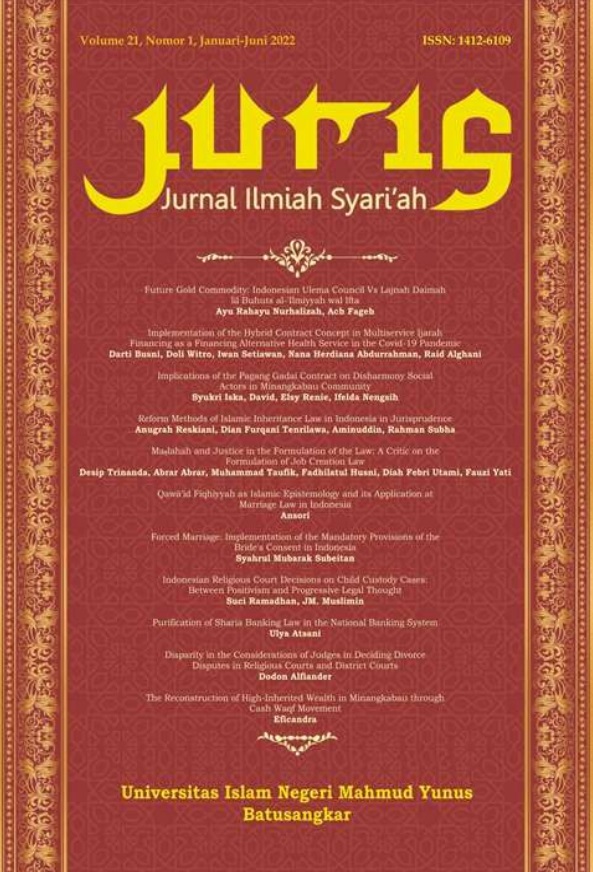Actualizing Islamic Economic Law in the Digital Era: A Study of the Application of Khiyar al-Majlis in Electronic Contracts
DOI:
https://doi.org/10.31958/juris.v23i2.11573Keywords:
Khiyar al-majlis, Option Rights, Electronic Contracts, Islamic Economic LawAbstract
This research was motivated by the emergence of electronic contracts, while every contract contains provisions and implementation of khiyar al-majlis, namely the right of the parties to the transaction to choose to continue or cancel a business transaction as long as the parties are still present at the transaction location. Due to the unclear existence and mechanism for implementing khiyar al-majlis in electronic contracts, this research was urgent. The aim of this research was to determine the existence and mechanism for implementing khiyar al-majlis in electronic contracts. The research method used was normative legal research with a systematic legal approach. Researchers use secondary data or legal materials obtained and processed using selective categorization. All of this legal material was grouped based on criteria that were appropriate to the problems and themes, then analyzed descriptively and analytically. The law of khiyar al-majlis was described and analyzed with explanation, study, systematization, interpretation, and evaluation. The results of this research showed that the existence of khiyar al-majlis in electronic contracts was only legal because the parties were not in the same transaction location as in conventional contracts. Then, the mechanism for implementing khiyar al-majlis could occur directly or indirectly in electronic contracts. This study contributes to the development and actualization of Islamic economic law in the digital era.References
Ali, Zsainuddin. 2010. Pelaksanaan Hukum Waris Di Indonesia. Jakarta : Sinar Grafika
Az-Zuhaili, Wahbah. 2011. Fiqih islam wa adillatuhu. Jilid 10. Jakarta: Gema Insani Press
Al-Qur'an dan Terjemahannya. 2012. Bandung: PT Cordoba Internasonal Indonesa.
Elimartati. 2010. Hukum Perdata Islam Di Indonesia. Batusangkar : STAIN Batusangkar Perss.
Hadikusuma, Hilman. 2003. Hukum Perkawinan Adat Dengan Adat Istiadat Dan Upacara Adatnya. PT Citra Aditya Bakti, Bandung
Hadikusuma, Hilman. 2003. Hukum Waris Adat. PT Citra Aditya Bakti, Bandung
Hamidjojo, Padjojo. 2000. Hukum Waris Indonesia. Stensil, Jakarta
Ibrahim. 2018. Metodologi Penelitian Kualitatif Panduan Penelitian Beserta Contoh Proposal Kualitatif. Bandung : Alfabeta.
Kamus Besar Bahasa Indonesia. 2011. Semarang: Widya Karya
Mardani. 2014. Hukum Keawrisan Islam Di Indonesia. Jakarta : PT Raja Grafindo Persada
Meliala, Djaja S, 2018. Hukum Waris Menurut kitab undangundang hukum perdata. Bandung: Nuansa Aulia
Malik, Abdul. 2018.’Ilmu Faraidh’. Ponogoro : Darussalam Press
Syarifuddin, Amir. 2004. Hukum Kewarisan Islam. Jakarta : Prenada Media
Sayuti Thalib, 2018. Hukum Kewarisan Islam Di Indonesia. Jakarta: Sinar Grafika
Sajuti Thalib, 2002. Hukum Kewarisan Islam Di Indonesia. Jakarta: Sinar Grafika
Syarifuddin, Amir. 1984: Pelaksanaan Hukum Kewarisan Islam Dalam Lingkungan Adat Minangkabau. Jakarta : PT Agung Gunung
Soebani, Beni Ahmad.2009.Fiqh Mawaris. Bandung: CV. Pustaka Setia
Syarifuddin, Amir. 2003. Garis-Garis Besar Fiqih. Jakarta: Kencana Prenada Media Group
SKRIPSI
Dewi, Erika Saraswati. 2020. Studi Komperasi Mengenai Hak Waris Di Tinjau Dari Hukum Adat Minangkabau Dan Kompilasi Hukum Islam. Skripsi. Universitas Pasundan. Bandung.
Hasan , Huzdi. 2019. Sistem Pembagian Waris Perempuan Dengan Metode Takharuj Dalam Hukum Kewarisan Islam (Studi Kasus di Kelurahan Ulu Gedong, Seberang Kota Jambi) . Skripsi. Program Studi Perbandngan Mazhab. UIN Shultan Thaha Saifuddin, Kota Jambi .50.
Lailah, Rizqi. 2011. Studi Perbanding Hukum Kewarisan Islam dengan Hukum Kewarisan Adat Kecamatan Bontoramba Kabupaten Jeneponto. Skripsi. UIN Alauddin Makassar, Makassar.
Nur, Andi Erwin. 2020. Urgensi Pembagian Warisan Secara Musyawarah Dalam Meminimalisir Perselisihan Ahli Waris Perspektif Hukum Islam ( Studi Desa Sugiale, Kec. Barebbo, Kab. Bonne) Skripsi. IAIN Bone, Bone.
JURNAL
As-Sahbuni Muhammad Ali. 1995. Hukum waris dalam syariat islam. Jurnal Ilmu Hukum. Bandung. 62 (1): 78.
Djohan, Meita. 2010. Kedudukan Kekuatan Warisan Tunggu Tubang Menurut Adat Semende. Jurnal Keadilan Progresif. 9(1): 89.
Husein Fikri. 2017. Konsepsi Hukum Waris Islam Dan Hukum Waris Adat. Jurnal Analisis Kontektualisasi Masyarakat. Jakarta. 81 (1): 56
Haries, Akhmad Analisis. 2014. Tentang Studi Komperatif Antara Hukum Kewarisan Islam Dan Hukum Kewarisan Adat. Jurnal FENOMENA. 6(2): 5.
Hamdani. Desember 2020. Konsep Takharuj Alternatif Pembagian Warisan. Al Hisab: Jurnal Ekonomi Syariah. 1 (1): 10.
Suhrah Wardi. 2013. Hukum Waris Islam. Jurnal Ilmu Syariah Dan Hukum. Jakarta. 51 (2): 44
Nugroho Sigit Sapto. 2016. Hukum Waris Adat di Indonesia. Jurnal Hukum Islam. Bandung. 71 (1): 54
WAWANCARA
Bapak Basrul, wawancara 15 Oktober 2022
Bapak Safrinas , wawancara 14 Oktober 2022
Bapak Sawal, wawancara 14 Oktober 2022
Bapak Sinuruik Bharuddin R, wawancara 13 Maret 2022)
Ibu Eka, wawancara 14 Oktober 2022
Ustadz Ilham Ahmad, wawancara, 17 Oktober 2022
Observasi, wawancara 1 Oktober 2022
Downloads
Additional Files
Published
How to Cite
Issue
Section
License
Copyright (c) 2024 Pauzi Muhammad, Farida Arianti, Ahmad Masum, Marniarani

This work is licensed under a Creative Commons Attribution-NonCommercial-NoDerivatives 4.0 International License.
Authors who publish with this journal agree to the following terms:- Authors retain copyright and grant the journal right of first publication with the work simultaneously licensed under a Creative Commons Attribution License that allows others to share the work with an acknowledgement of the work's authorship and initial publication in this journal.
- Authors are able to enter into separate, additional contractual arrangements for the non-exclusive distribution of the journal's published version of the work (e.g., post it to an institutional repository or publish it in a book), with an acknowledgement of its initial publication in this journal.
- Authors are permitted and encouraged to post their work online (e.g., in institutional repositories or on their website) prior to and during the submission process, as it can lead to productive exchanges, as well as earlier and greater citation of published work (See The Effect of Open Access).








